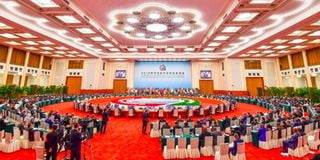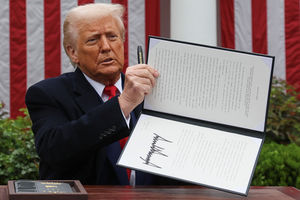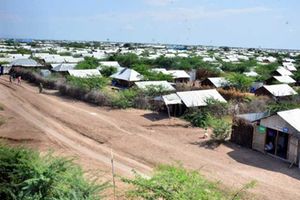
A gathering of African Heads of State and Government at a High Level meeting during the Forum on China-Africa Cooperation (FOCAC) 2018 Summit in Beijing, China.
The 70th anniversary of the historic meeting of Asian and African leaders in Bandung, Indonesia, is coming up next month. In April 1955, that gathering of 29 countries, most of them newly independent, included leaders from China, India, Indonesia, Egypt, Ethiopia, Sudan, Liberia, Libya, the Gold Coast, Iran, Pakistan and Vietnam among others.
Six African countries participated. They represented almost half of the membership of the United Nations and 1.5 billion people at the time. The idea of the Conference was mooted by Indonesia and subsequently received support from India, Pakistan, Burma and Ceylon (now Sri Lanka).
In the context of the Cold War and the decolonisation movement, it was pivotal to the eventual creation of the Non-Aligned Movement (in 1961), an early multilateral formation of global South countries, giving common voice to their interests and perspectives in the global arena. It also inspired the 1957 Afro-Asian People’s Solidarity Conference in Cairo and the Belgrade Conference of 1961.
The Conference Communique outlined 10 principles that remain relevant today. Those principles underscored human rights, sovereignty and territorial integrity of nations, equality of all races and nations and peaceful resolution of conflicts and disputes.
The principles of mutual interest and solidarity espoused by that conference inspired the spirit of “South- South cooperation” that endures to-date and is seen in the various regional initiatives advancing that vision in Africa, Asia and Latin America. Be it the African Union, the Community of Latin American and Caribbean States, the Association of Southeast Asian Nations or the wider BRICS bloc.
Upholding these principles was considered key to maintaining international peace and security, a necessary ingredient for the common well-being and prosperity of all. The aims of the Bandung Conference are worth revisiting today.
The desire for Afro-Asian economic and cultural cooperation and to renounce all forms of colonialism and neo-colonialism can be a powerful organising framework in today’s polarised world and politics.
Geopolitical dynamics
Amidst emerging geopolitical dynamics and heightened intolerance, the Bandung spirit can inspire an alternate centre of resistance and philosophy for international political and economic cooperation.
Remarkably, the Bandung Conference urged for a peaceful settlement of the Palestine question, calling for the implementation of the United Nations resolutions on Palestine and declaring support for the people of Palestine. It also decried the inadequate representation of African and Asian nations in the Security Council. To avert destructive wars, the Bandung Communique supported disarmament and prohibition of production, experimentation and use of nuclear weapons of war.
Unsurprisingly, the conference embodied a spirit of defiance - it convened countries newly emerging from the shackles of colonial rule amidst the fierce Cold War rivalry between the United States of America and the Union of Soviet Socialist Republics (USSR).
Its spirit fired up the collective push for reforms to redress power imbalances in the governance of global institutions in the ensuing period, up to the 80s. Today, many of those issues remain unresolved as neo-colonial influences and a fragmented world order unfolds. Threats of trade wars and economic sanctions undermine the core tenets of the Bandung Conference.
Atieno Ndomo is a Social Policy Analyst with a keen interest in political economy.










